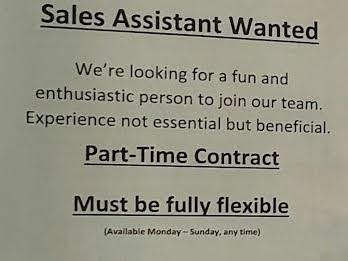 |
Photo adapt. from Paul L Dineen, via Flickr. CC by 2.0 |
You may see these words used in job advertisements or staff-wanted signs:
- Flexible hours
- Flexible working
- Fully-flexible
They all look similar, but they mean very different things.
Flexible hours
If a job is advertised as having flexible hours, it usually means that it is for a certain number of hours each day or week, but they are happy to talk about when those hours are worked.
For example, some people start later so they can take children to school first. In some jobs, flexible hours may mean there are no set hours of work: it’s up to you to work for long enough to get the job done.
Flexible working
A job with flexible working conditions is like one with flexible hours, but has even more options: you may be able to work part time, or from home, etc.
Fully-flexible
Many "staff-wanted" job advertisements say you must be fully flexible.
Usually in these jobs, the employer agrees to give you a certain number of hours work each week, but the days and hours that you work are different each week or month, and you need to be available to work at any day or time.
For example, one week you may work from 10am to 2pm on Monday and Saturday, but the next week you work from 4-8pm on Thursday and Friday.
Fully-flexible jobs are often used when the number of customers can be change a lot. For example in restaurants which are very busy during holidays, or fashion shops which have summer and winter sales. Or they may have a lot of staff who sometimes take time off, eg students for exams, and need flexible staff to be work extra hours at times.
 |
| Example of a staff-wanted advertisement, which spells out what fully-flexible means |
How do you know your hours in fully-flexible job?
Are fully-flexible jobs a good idea?
Some people don't like fully-flexible jobs: they think it is unfair, and discriminates against people - and that it's especially so when the job is only part-time, but the employee is expected to be available to work any-time.
And it's certainly true that not can be fully flexible, for example, people who need to get someone to look after their children during working hours.
But fully-flexible jobs are good for people who don’t have commitments, and who want to get lots of hours or experience . And some people (eg artists, musicians, students) like being able to ask for time off when other they are doing other things, and happy to work extra hours when they aren't.

No comments:
Post a Comment